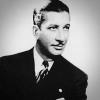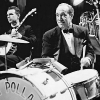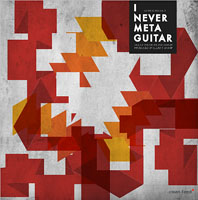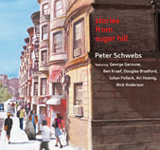Home » Jazz Articles » Record Label Profile » Retrieval Records: Treasures Lost and Found
Retrieval Records: Treasures Lost and Found

Louis Armstrong
trumpet and vocals1901 - 1971
"You hear about the Duke Ellingtons, the Jimmie Luncefords, and the Fletcher Hendersons, but people sometimes forget that jazz was not only built in the minds of the great ones, but on the backs of the ordinary ones."—

Cab Calloway
composer / conductor1907 - 1994
Those two quotes resonate strongly with the subject matter of this article. Believe it or not, there are many jazz fans out there in the world who really do appreciate and love classic, traditional, "hot" jazz music. Even in the age of digital technology, there are hundreds of blogs out in cyberspace dedicated to early jazz music. So, why is it that when a seasoned jazz fan goes to a website dedicated to jazz music, it's often impossible to find much information on A.J. Piron,

Adrian Rollini
multi-instrumentalist1904 - 1956
Harry Reser
b.1896Fess Williams
b.1894
Miles Davis
trumpet1926 - 1991
This attitude is in contrast to the one prevailing at All About Jazz. The folks at here are truly living up to their name, and blazing forward not only with a new website design, but broader content. By encouraging coverage of this ignored area of the idiom, the site is truly giving a comprehensive view of the entire spectrum of jazz. So, let the record stand that AAJ is the only place in cyberspace where you can find articles on trumpeter

Dave Douglas
trumpetb.1963
One of the finest examples of a record label offering some of the most comprehensive sides to artists of long ago is the Retrieval division of Challenge Records. Retrieval Records' disclaimer states that they took over the Fountain catalogue, founded in 1971 by Ron Jewson and Norman Stevens, later joined by
John R.T. Davies
b.1937These classic artists are not close to the popularity of a Kanye West, Beyonce or even saxophonist

Chris Potter
saxophone, tenorb.1971

Bill Frisell
guitar, electricb.1951
 Piron's New Orleans Orchestra
Piron's New Orleans OrchestraPiron's New Orleans Orchestra featuring Lorenzo Tio Jr.
The recordings on this fine collection are from late 1923 to early 1925. A.J. Piron's Orchestra recorded some of the earliest material featuring trumpeter
Peter Bocage
b.1887Louis Cottrell
b.1878
Clarence Williams
bass, electricb.1893

Freddie Keppard
cornet1890 - 1933

Bill Johnson
b.1912
King Oliver
trumpet1881 - 1938
Standout tracks: Ghost of the Blues; Bouncing Around; Bright Star Blues; West Indies Blues; New Orleans Wiggle; Mama's Gone Goodbye.
 Harry Reser's Six Jumping Jacks
Harry Reser's Six Jumping Jacks1926-1930
Harry Reser
b.1896Growing up, Reser had perfect pitch and started playing professionally at the age of 16 on piano (so he could be compared with Justin Bieber as well). The 1910s saw the banjo take flight in popularity. A young Harry Reser took up the tenor banjo due to its similarities to violin tuning. He then met Gus Haenschen, who was the manager of the records department of the newly formed Brunswick label. It was through Haenschen that Reser found plenty of work in New York as a studio musician playing with everyone from
Ted Lewis
b.1892
Bessie Smith
vocals1894 - 1937
One of the main featured soloists for the Jumping Jacks was Larry Abbott. Besides playing wonderful clarinet, alto saxophone, and "hot" kazoo solos, he apparently knew how to teleport from coast to coast (please save all "Hey Abbott" jokes until the end). Retrieval even suggests that if indeed there is only one Larry Abbott (and not just another reedman with the same name) then this guy needs to be seriously looked into. Abbott's work is documented to have started in the early 1920s when he was a member of Herb Wiedoeft's Cinderella Roof Orchestra in California. In May of 1928, Wiedoeft with a number of his band members (including Abbott) were driving from Klamath Falls to Medford, Oregon through vicious weather for a gig. Just outside of Pinehurst, the car swerved and wound up in a ditch. Abbott and Wiedoeft both had serious head injuries, with Wiedoeft also suffering broken ribs and a punctured lung. The circumstances were so bad that Wiedoeft caught pneumonia and died the following day. Four days later, Larry Abbott was named in the Brunswick files in New York as being one of the vocalists on Reser's "Etiquette Blues." This suggests that there are two different Abbotts, but no one knows for sure. Either way it is interesting.
Reser fell out of popularity during the Great Depression in America, only to return in the 1950s as part of the contemporary Dixieland Revival. After a short burst of popularity and work in the 1950s, Reser went to work for New York's Broadway pit orchestras in the 1960s, landing work with many shows including the premiere of Fiddler on the Roof.
Standout tracks: She's Got "It;" Etiquette Blues; I Wonder How I Look When I'm Asleep; She's Got Great Ideas.
 The University Six
The University Six1925-1927
" data-original-title="" title="">University Six was a group that featured

Adrian Rollini
multi-instrumentalist1904 - 1956

Harry Carney
saxophone, baritone1910 - 1974

Don Redman
arranger1900 - 1964

Coleman Hawkins
saxophone, tenor1904 - 1969
There's one big reason why the University Six's sides did not achieve the vast commercial success Rollini planned. At the time these sides were cut (1925-1927), the recording industry was being flooded by some of the best new soloists of the time:

Louis Armstrong
trumpet and vocals1901 - 1971

Clarence Williams
bass, electricb.1893

Bix Beiderbecke
cornet1903 - 1931

Red Nichols
b.1905
Coleman Hawkins
saxophone, tenor1904 - 1969

Don Redman
arranger1900 - 1964

Jimmy Dorsey
composer / conductor1904 - 1957
The only musician in the University Six who could hang in this ultra-modern company would have been Adrian Rollini. In fact, the listener can hear how Rollini is the only one playing with this new sense of "relaxed modernism." This really sticks out like a sore thumb against the antique approach still being played by Roy Johnston (trumpet) and Bobby Davis, who were still immersed in the "hot" style of jazz: their delivery of eighth notes gives evidence to this. Listeners can hear Johnston play Bix Beiderbecke's solo note for note on "Tiger Rag." What's so amazing is that Beiderbecke's record of "Tiger Rag" had not been issued yet. Many musicians just knew how Beiderbecke played it night after night, which is quite a testimony to the sway Beiderbecke's style had over musicians at the time.
By late 1926, the University Six experienced two interesting developments. Rollini started to record on the xylophone, yet another instrument in his arsenal of expressions. Secondly, " data-original-title="" title="">Chelsea Quealey came in for the trumpet chair. Quealey shared Rollini's enthusiasm for the new style of soloing, and the sides with him alongside Rollini are some of the most smooth and swinging on the entire disc. This vibe is infectious and spreads throughout the entire group as "Lazy Weather" shows Quealey and Davis' homage to Beiderbecke and

Frankie Trumbauer
saxophone1901 - 1956
These recordings are only a fraction of various "rambler" combinations. So, if you like what you hear with the University Six, be sure and check out the other groups: " data-original-title="" title="">California Ramblers, " data-original-title="" title="">Little Ramblers, the Varsity Eight, " data-original-title="" title="">Goofus Five, the Vagabonds, or the Golden Gate Orchestra.
Standout tracks: The Camel Walk; In Your Green Hat; Tiger Rag; San; Give Me a Ukelele; She's Got "It;" Lazy Weather; Pastafazoola; Zulu Wail.
 Johnny De Droit & the New Orleans Jazz Orchestra / The Arcadian Serenaders
Johnny De Droit & the New Orleans Jazz Orchestra / The Arcadian SerenadersThe Complete Sets: 1924-1925
This disc is divided into two sections: one part features Johnny De Droit & the New Orleans Jazz Orchestra (tracks 1-9) and the other is dedicated to the Arcadian Serenaders (tracks 10-23). Retrieval's liner notes for this disc start out with a bold statement saying that all jazz enthusiasts owe a debt of gratitude to the General Phonogragh Corporation (proprietors of the OKeh label) for sending teams of recording experts and talent scouts to remote areas of the United States, besides Chicago and New York. One of the places OKeh went and scored big was New Orleans, Louisiana.
While in New Orleans, the very first band that OKeh signed was that of Johnny De Droit. The reason the label signed De Droit was partly due to his unique muted trumpet stylings. The other draw was the fact that De Droit had an alto saxophone in the band, giving the lineup an overall warmer and richer sound. This led to an engagement in New York City, where it recorded "Eccentric" and "Lucky Kentucky" as well as the smash hit "When My Sugar Walks Down the Street." In fact, let the record state that De Droit either composed or arranged five of the nine tracks on this disc. After its New York stint, the band returned to New Orleans, but unfortunately never recorded again.
While the General Phonograph Corporation was down in New Orleans, another cornet player caught its ear. This was Stirling Bose, who played with the Original Crescent City Jazzers. During 1925-42, Bose and his men were musical nomads. These years saw them move from New Orleans to St. Louis, Kansas City to Chicago and then to New York City.
The group decided to change its name from the Original Crescent City Jazzers to the Arcadian Serenaders in honor of the ballroom they played at in St. Louis. Stirling Bose wound up playing with just about every big name from the swing era:

Ben Pollack
drums1903 - 1971

Tommy Dorsey
trombone1905 - 1956

Ray Noble
composer / conductor1903 - 1978

Bob Crosby
saxophone, alto1913 - 1993

Glenn Miller
trombone1904 - 1944

Benny Goodman
clarinet1909 - 1986
As far as the overall style of the band, it was a cross combination between the classic New Orleans style and the new sound of Bix Beiderbecke and Frankie Trumbauer—the latter so much, that Cliff Holman's delivery on the alto sax made jazz enthusiasts believe that Frankie Trumbauer himself had come to sit in with them! Bose's style was so similar to Bix Beiderbecke's (not only in sound but also in fluidity and modernity) that he was called to take Beiderbecke's chair in the

Jean Goldkette
b.1899Wingy Manone
b.1900Standout tracks: Eccentric; Lucky Kentucky; Brown Eyes; When My Sugar Walks Down the Street; Sensation Rag; Chrstine; Bobbed Haired Bobbie; You Gotta Know How; Just a Little Bit Bad.
 The Georgians 1922-1923
The Georgians 1922-1923" data-original-title="" title="">Georgians came about as a result of an offshoot group from
Frank Guarente
b.1893
Arthur Schutt
b.1902
Thelonious Monk
piano1917 - 1982
In 1921, Guarente joined Paul Specht's Orchestra. Specht owned a booking agency and placed Guarente in charge of booking European bands into British venues. This area of the agency grew to quite an extent, showing Guarente's promise. In 1922, the Georgians made their recording debut as Specht's Society Syncopators. By its next record, the Georgians were recording for Columbia Records. Unfortunately, one of the policies at Columbia Records was to have someone polish the masters of their catalog. Over time, this polishing rubbed away many of the recorded grooves on the records. Because of this, Retrieval has tried diligently to find the lowest stamper numbers in order to provide the clearest sound available for this disc.
As a group, the Georgians were polished in many areas (all puns intended). They were very effective on up-tempo tunes as well as slow blues and pop tunes for the day. Even the song "Old King Tut" was recorded in response to current events—Howard Carter and Lord Caernarvon had opened King Tutankhamen's tomb the previous year, starting the entire King Tut craze (some things never change: see Steve Martin). One of the things the Georgians must be given credit for is that it was one of the first bands (black or white) to have well crafted arrangements documenting the spirit and rhythms of jazz. This is large part due to both Arthur Schutt's experimentation and growth and Guarente's technique and power on the trumpet as well as his time spent with King Oliver.
Standout tracks: Learn to Do the Strut; I'm Sitting Pretty in a Pretty Little City; Long Lost Mamma; Old King Tut; Snakes Hips; Chicago (That Toddling Town).
 Fess Williams Pre-Victors, The Complete Set: 1925-1927
Fess Williams Pre-Victors, The Complete Set: 1925-1927Stanley "Fess" Williams was not a great jazz clarinetist and saxophonist in his own right, he was smart enough to hire some of the best jazz players to play with him and support his personality on stage. He fell more in the "entertainer" category than the "virtuoso" category. Although his group remained virtually the same, Williams' career can be divided into three distinct periods: recording for Gennett and OKeh in 1925-26 with his small band, recording for Vocalion in 1927 with a slightly larger band, and recording for Victor Records in 1929-30.
Strangely enough, Williams received the nickname "Fess" from actually teaching music and athletics for 4 years. When he returned to the music business, he moved to Chicago for a job that never materialized. Looking for any work, he landed a few gigs playing "breakfast dances" (which typically lasted from 3am—8am), working alongside players like Freddie Keppard and King Oliver.
In 1923, Williams was in Richmond, Indiana and witnessed King Oliver make his classic sides for the Gennett label. Williams also co-led a band with trumpet great

Tommy Ladnier
trumpet1900 - 1939

Chick Webb
drums1905 - 1939
When Williams started recording for Vocalion, he sounded as if he had acquired a fuller tone and a rounder sound. This was partly due to Vocalion finally agreeing to pay Western Electric their fees. Western electric had a technical system superior to anyone other of the time. The result was a night and day difference in Williams' tone. He no longer had a dry, thin, distorted tone to his clarinet. He sounded as he should have all done along.
By 1927, Williams finally added a tuba for some lower bass foundation, along with another saxophone and another trumpet. This enhanced the fullness of the band, and the best track to hear this difference on is "White Ghost Shivers." By the time Williams records "Gambler's Blues" (aka St. James Infirmary), he had a trombone, four saxophones, piano and tuba. Yet by the time he recorded his next release, he had added enough musicians to start using some of Don Redman's arrangements. Although Williams may not have been a virtuoso, he was good enough to play Redman arrangements and learn enough from them to settle into his own style of arranging, giving the band their own personal sound. As 1929 came around, Williams returned to the Savoy Ballroom and started recording popular sides for Victor Records.
In 1930, Williams turned over all his booking management to NBC (National Broadcasting Company). While NBC found Williams some work, he was growing tired of empty promises and little notoriety. NBC had told him that it was working on having him star in a motion picture that featured radio stars Amos & Andy. For some reason, production of the film was held back, and Williams had had enough, claiming that NBC was using this as a stalling ploy. He demanded to be released, and NBC let him go. Two months later, Check and Double Check went into production with a young bandleader named

Duke Ellington
piano1899 - 1974
The remainder of the 1930s found Williams playing with

James P. Johnson
piano1894 - 1955
Standout tracks: Wimmin---Aah!, Messin Around; High Fever; White Ghost Shivers; Gambler's Blues; Alligator Crawl; Razor Edge.
 Spike Hughes Spike Hughes and His Negro Orchestra—The Complete Set: 1933
Spike Hughes Spike Hughes and His Negro Orchestra—The Complete Set: 1933Spike Hughes
b.1908Hughes decided he wanted to spearhead an all-star group to record a few sides including some of his originals. This group would consist of some of the absolute best jazz musicians of the day:

Benny Carter
saxophone, alto1907 - 2003

Dicky Wells
trombone1907 - 1985
Wilbur DeParis
b.1900
Coleman Hawkins
saxophone, tenor1904 - 1969

Big Sid Catlett
drums1910 - 1951

Luis Russell
composer / conductorb.1902

Chu Berry
saxophone, tenor1908 - 1941
J.C. Higginbotham
b.1906
Teddy Wilson
piano1912 - 1986
All of the sides were recorded in 1933. On "Someone Stole Gabriel's Horn," Hughes decided to end the chart with a rather dissonant chord (something highly unusual for its day). Hughes' original "Pastorale" is based on the tones of the pentatonic scale. Some jazz enthusiasts say that Hughes was so enamored with Duke Ellington that his "Arabesque" sounds more like Duke Ellington than Ellington himself. This particular session ends with everyone jamming out on "Sweet Sue—Just You" in which we actually get to hear Hughes play bass. But this being the first time he played since arriving in the United States, he had to put plaster around his fingers to avoid them being cut to shreds. The other highlight of "Sweet Sue" is
Wayman Carver
flute1905 - 1967
After the conclusion of these sessions, Spike Hughes retired from recording in the jazz field. Hughes claimed that he had reached his creative and artistic peak. Hughes quietly went back to being a classical music critic, leaving his history and output within the recorded grooves of carved wax for others to speculate upon and enjoy.
Standout tracks: Someone Stole Gabriel's Horn; Pastorale; Arabesque; Sweet Sue—Just You; Firebird; Swing It; Synthetic Love; Devil's Holiday; Blue Lou.
As a closing note, it's safe to say that if you're interested in accurate, great sounding classic jazz music, Retrieval Records has put a lot of hard work into their catalog, and it has paid off. The sound quality is fantastic and pure joy to listen to.
Tags
Retrieval Records
Record Label Profiles
Nathan Holaway
United States
Louis Armstrong
Cab Calloway
Adrian Rollini
Harry Reser
Fess Williams
Miles Davis
Dave Douglas
Georgians
John R. T. Davies
Chris Potter
Bill Frisell
Peter Bocage
Louis Cottrell
Clarence Williams
Olympia Band
Freddie Keppard
Bill Johnson
King Oliver
Harry Reser and his Six Jumping Jacks
Ted Lewis
Bessie Smith
The University Six
Little Ramblers
California Ramblers
Harry Carney
Don Redman
Coleman Hawkins
Bix Beiderbecke
Red Nichols
Jimmy Dorsey
Chelsea Quealey
Frankie Trumbauer
The California Ramblers
The Little Ramblers
The Goofus Five
Ben Pollack
Tommy Dorsey
Ray Noble
Bob Crosby
Glenn Miller
Benny Goodman
Jean Goldkette
Wingy Manone
The Georgians
Frank Guarente
Arthur Schutt
Thelonious Monk
Tommy Ladnier
Chick Webb
duke ellington
James P. Johnson
Spike Hughes
Benny Carter
Dicky Wells
Wilbur de Paris
Sid Catlett
Henry "Red" Allen
Luis Russell
Chu Berry
J.C. Higginbotham
Teddy Wilson
Wayman Carver
Comments
PREVIOUS / NEXT
Support All About Jazz
 All About Jazz has been a pillar of jazz since 1995, championing it as an art form and, more importantly, supporting the musicians who make it. Our enduring commitment has made "AAJ" one of the most culturally important websites of its kind, read by hundreds of thousands of fans, musicians and industry figures every month.
All About Jazz has been a pillar of jazz since 1995, championing it as an art form and, more importantly, supporting the musicians who make it. Our enduring commitment has made "AAJ" one of the most culturally important websites of its kind, read by hundreds of thousands of fans, musicians and industry figures every month.







 Buy Now
Buy Now





















